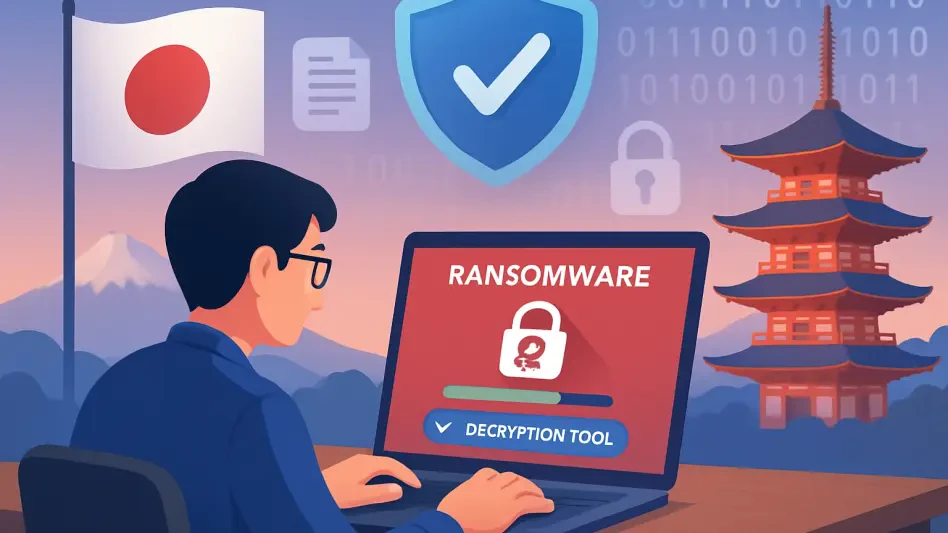In an era where digital threats loom larger than ever, ransomware has emerged as a devastating force, locking critical data and extorting millions from businesses, hospitals, and governments across the globe, with attacks halting operations and draining resources on an unprecedented level. The scale of disruption is staggering. Yet, amidst this growing crisis, Japan has positioned itself as a beacon of hope with a groundbreaking decryption tool that challenges the very foundation of ransomware schemes. Once perceived as lagging in the cybersecurity race compared to Western powerhouses, Japan is now at the forefront, crafting innovative solutions that not only protect its own shores but also extend a lifeline to victims worldwide. This remarkable shift is driven by the National Police Agency (NPA), which has spearheaded efforts to combat notorious ransomware strains. Through technological ingenuity and international partnerships, Japan is redefining how the world confronts cybercrime, setting a new standard for defense in the digital age.
Breaking New Ground with Decryption Technology
Japan’s National Police Agency has achieved a historic milestone by developing the world’s first decryption tool specifically designed to combat ransomware variants such as Phobos and 8Base. Unveiled recently, this cutting-edge software can decrypt locked data in a matter of seconds to hours, offering a powerful alternative to paying hefty ransoms. Its impact has already been felt domestically, with at least ten successful cases where private companies regained access to their systems without conceding to criminal demands. This rapid recovery capability marks a significant departure from the helplessness often associated with ransomware attacks, providing a tangible solution to a pervasive problem. Beyond its technical prowess, the tool represents a shift in mindset, empowering victims to reclaim control over their digital assets and sending a clear message to cybercriminals that their tactics can be countered effectively.
The broader implications of this technological breakthrough are profound, as it addresses a critical gap in ransomware defense strategies. While many organizations previously faced the grim choice between paying ransoms or losing vital data, Japan’s innovation offers a third path: restoration without compromise. Successful deployments in domestic scenarios underscore its reliability, with full data recovery achieved in each documented instance. This success is not merely a local victory but a potential game-changer for global cybersecurity, as the tool’s effectiveness hints at scalability across different ransomware strains. Moreover, it challenges the economic model of cybercrime by reducing the incentive for attackers when victims can recover without payment. Japan’s pioneering approach thus serves as both a practical solution and a strategic deterrent, reshaping the landscape of digital defense with a focus on resilience and recovery.
Power of Global Partnerships in Cyber Defense
The development of Japan’s decryption tool is a testament to the strength of international collaboration in addressing the borderless nature of cybercrime. The NPA worked closely with prominent agencies like the FBI and Europol, pooling resources and intelligence to unravel the complex mechanisms of ransomware. A pivotal moment came when the FBI apprehended a key figure linked to Phobos and shared essential system data with Japanese authorities, providing a crucial piece of the puzzle. Additionally, the discovery of a ransomware-building mechanism on the dark web offered further insights into the malware’s architecture, enabling the creation of an effective decryption key. This cooperative framework illustrates how shared expertise and data can dismantle even the most sophisticated cyber threats, reinforcing the importance of unity in a field where attackers often exploit jurisdictional divides.
Beyond individual contributions, this partnership reflects a broader trend of collective action as a cornerstone of modern cybersecurity. Experts in the field emphasize that no single nation can tackle ransomware alone, given its global reach and evolving tactics. Japan’s collaboration with international bodies not only accelerated the tool’s development but also ensured that its benefits extend far beyond national borders. The exchange of critical information and joint investigative efforts have set a precedent for how countries can align against common digital enemies. This synergy is particularly vital as ransomware groups often operate from safe havens, necessitating coordinated responses to track, disrupt, and neutralize their operations. By fostering such alliances, Japan has helped build a networked defense system that amplifies the impact of individual innovations, creating a more robust shield against cyber threats worldwide.
Transformation of Japan’s Cybersecurity Stance
Historically viewed as trailing behind the United States and European nations in cybersecurity readiness, Japan has undergone a dramatic transformation in recent years. The establishment of a dedicated cyber investigation team in 2022, which later expanded into a full department with over 300 personnel, marked the beginning of this shift. This unit has since demonstrated remarkable progress, building on earlier achievements like a decryption tool for LockBit ransomware to now tackle even more complex strains. The rapid evolution of Japan’s capabilities is driven by a combination of skilled technologists and a strategic focus on continuous improvement, positioning the nation as a serious contender in the global cyber defense arena. This newfound strength reflects a deliberate effort to close gaps and adapt to the escalating demands of digital security.
Japan’s ascent in this domain is not just about technological advancements but also about a cultural and institutional commitment to safeguarding the digital landscape. The NPA’s emphasis on developing specialized tools through both collaboration and internal innovation highlights a proactive approach that contrasts with past perceptions of passivity. This shift has been bolstered by investments in training and resources, ensuring that personnel are equipped to handle sophisticated threats. Furthermore, successes in countering ransomware have boosted national confidence, encouraging further initiatives to protect critical infrastructure and private enterprises alike. As Japan continues to refine its expertise, it is carving out a leadership role that inspires other nations to elevate their own defenses, demonstrating that determination and strategic focus can turn underdogs into frontrunners in the fight against cybercrime.
Widening Access to Ransomware Recovery Solutions
One of the most striking aspects of Japan’s contribution to global cybersecurity is the accessibility of its decryption tool. Available for free through the NPA’s website and The No More Ransom Project, an initiative led by Europol, the software reaches victims across the world with ease. This open distribution model is particularly significant for the over 2,000 organizations impacted by Phobos ransomware in 22 countries since 2018, many of whom previously faced insurmountable losses. By removing financial barriers to recovery, Japan ensures that small businesses, municipalities, and under-resourced entities can benefit from cutting-edge technology without additional strain. This democratization of defense tools levels the playing field, offering hope to diverse victims grappling with the aftermath of cyberattacks.
The global reach of this initiative underscores a critical principle: effective cybersecurity must be inclusive to counter the universal threat of ransomware. Making the tool accessible via a multilingual platform further enhances its impact, breaking down linguistic and technical obstacles for users worldwide. This approach not only aids immediate recovery but also builds trust in international efforts to combat cybercrime, encouraging more victims to seek solutions rather than pay ransoms. Additionally, it disrupts the profitability of ransomware operations by reducing successful extortion outcomes, potentially deterring future attacks. Japan’s commitment to sharing its innovation freely reflects a broader vision of collective security, where the benefits of technological progress are not hoarded but extended to those in greatest need, fostering a united front against digital adversaries.
Navigating the Challenges of Evolving Threats
Even with Japan’s groundbreaking tool, the fight against ransomware remains an uphill battle due to the relentless adaptability of cybercriminals. Experts caution that attackers are continuously refining their methods, developing new encryption techniques and evasion strategies to bypass existing defenses. While the decryption software represents a significant leap forward, it is not a comprehensive solution to the multifaceted nature of cyber threats. The dynamic landscape of ransomware demands constant vigilance and innovation, as relying solely on reactive measures risks falling behind the curve. This reality highlights the limitations of even the most advanced tools when pitted against an enemy that thrives on unpredictability and innovation.
Complementing technological solutions with fundamental preventive practices, often referred to as “cyber hygiene,” is essential to bolster overall security. Simple steps such as implementing strong passwords, regularly updating software, and training staff to recognize phishing attempts can significantly reduce vulnerability to attacks. Japan’s success in decryption serves as a reminder that while recovery tools are vital, they must be paired with proactive measures to create a layered defense. The evolving nature of cyber threats also calls for ongoing international dialogue to anticipate and counter new tactics before they wreak havoc. By balancing innovation with education and prevention, the global community can better prepare for future challenges, ensuring that tools like Japan’s remain effective amidst a constantly shifting digital battlefield.
Shaping a Future of Collective Digital Security
Reflecting on Japan’s journey, it’s evident that the nation has carved a pivotal role in the global struggle against ransomware through persistent effort and strategic alliances. The development of a decryption tool by the NPA has not only shielded domestic entities—90 municipalities targeted by Phobos since 2020—but also extended critical support to international victims. This dual impact has underscored the importance of shared responsibility in cybersecurity, where national advancements contribute to worldwide resilience. Japan’s transformation into a leader has set a powerful example, proving that dedication and collaboration can overcome historical shortcomings in digital defense.
Looking ahead, the path forward demands sustained innovation and deeper global partnerships to address the sophisticated nature of cyber threats. Governments and organizations must prioritize investments in both cutting-edge tools and foundational security practices to build robust defenses. Additionally, expanding platforms like The No More Ransom Project can ensure that solutions remain accessible to all, particularly in regions with limited resources. Japan’s pioneering efforts should inspire a renewed focus on collective strategies, encouraging nations to pool expertise and resources for a safer digital environment. By continuing to adapt and share knowledge, the international community can stay one step ahead of cybercriminals, securing a future where technology serves as a shield rather than a vulnerability.








